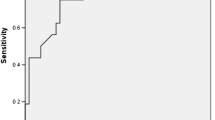Abstract
Normal serum PAP levels on admission to the hospital in patiens with acute pancreatitis has been proposed to help select the patients who are not going to develop complications. The aims of this study were, first, to assess the specificity of serum pancreatitis - associated protein (PAP) serology test and second, to evalute the usefulness of the test for prediciting complications in acute pancreatitis on admission to the hospital. The sensitivity of the PAP ELISA in patiens with acute pancreatitis on admission to the hospital was 70% and the serum PAP levels significantly higher than in healthy controls (p > 0.0001). However, the serum PAP levels in patients with acute pancreatitis were not significantly different from values in patients with various abdominal diseases (p > 0.58). Serum PAP levels gave good correlation to APACHE II (p = 0.02) and CRP (p = 0.01). Two patients with local complications (necrotizing pancreatitis, pancreatic fluid collection) had elevated serum PAP levels on admission to the hospital (< 100 ng/ml). The diagnostic specififity of PAP ELISA is low. Patients, who develop local complications in acute pancreatitis can not be excluded by normal serum PAP levels on admission to the hospital.
Similar content being viewed by others
References
AgarwalN and Pitchumani CS: Assessment of severity in acute pancreatitis. Am J Gastroenterol 86:1385–1391, 1991.
Bank S, WiseL and GerstenM. Risk factors in acute pancreatitis. Am J Gastroenterol 78:637–640, 1983.
Knaus WA, Draper EA, Wagner DP and Zimmerman JE: APACHE II: A severity of disease classification system. Crit Care Med 13:818–829, 1985.
Ranson JHC, Rifkind KM, Roses DE, et al: Prognostic signs and role of operative management in acute pancreatitis. Surg Gynecol Obstet 139:69–81, 1974.
Heath DI, Cruickshank A, GudgeonM, et al: Role of inter leukin-6 in mediating the acute phase protein response and potential as an early means of severity assessment in acute pancreatitis. Gut 34:41–45, 1993.
Puolakkainen P, Valtonen V, PaananenA and SchroderT: Creactive protein (CRP) and serum phospholipase A2 in the assessment of the severity of the acute pancreatitis. Gut 28:764- 771,1987.
Iovanna JL, Keim V, NordbackI, et al: Serum concentrations of pancreatitis-associated protein (PAP) correlate with the severity of the acute pancreatitis. Gastroenterology 105:309–311, 1993.
Keim V, Iovanna JL;RohrG, et al: Purificatian and partial characterization of a rat pancreatic secretory protein associated with acute pancreatitis. Gastroenterology 100:775–781, 1991.
Keim V, Iovanna JL and Dagorn JC: The acute phase reaction of the exocrine pancreas. Digestion 55:65–72, 1994.
Iovanna JI,, Keim V, NordbackI, et al: Serum concentrations of pancreatitis-associated protein (PAP) correlate with the severity of the acute pancreatitis. Gastroenterology 106:728–734, 1994.
Author information
Authors and Affiliations
Rights and permissions
About this article
Cite this article
Polanec, J., P Pavelic, Z., Krizman, I. et al. Low serum pancreatitis-associated protein does not exclude complications in mild acute pancreatitis. Pathol. Oncol. Res. 3, 30–33 (1997). https://doi.org/10.1007/BF02893349
Received:
Accepted:
Issue Date:
DOI: https://doi.org/10.1007/BF02893349




